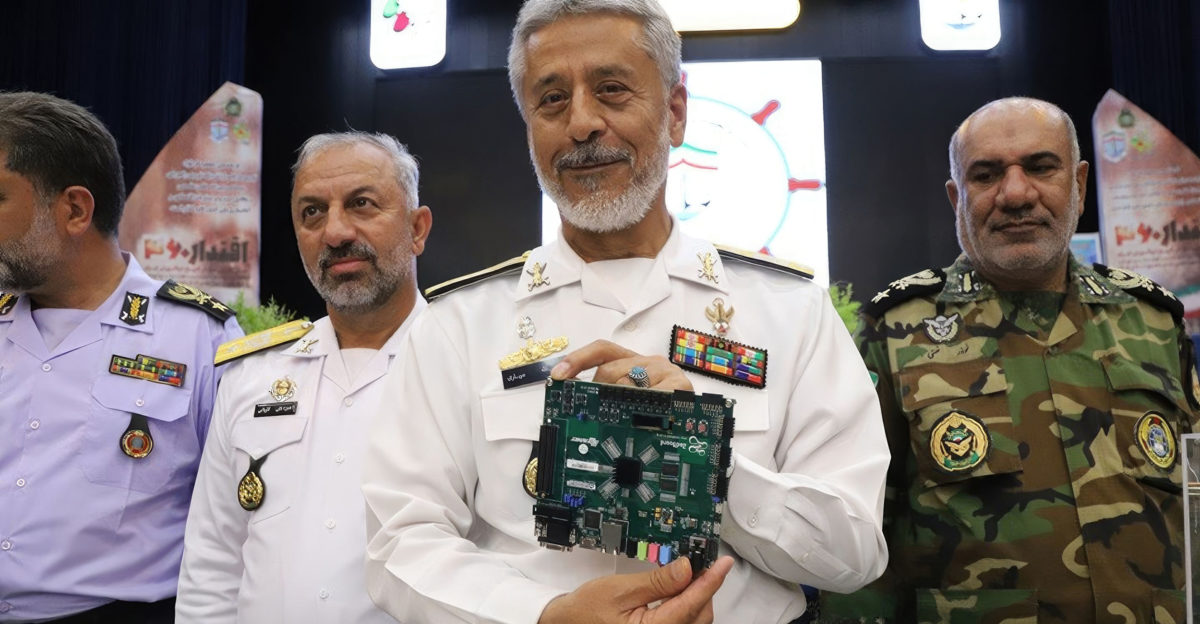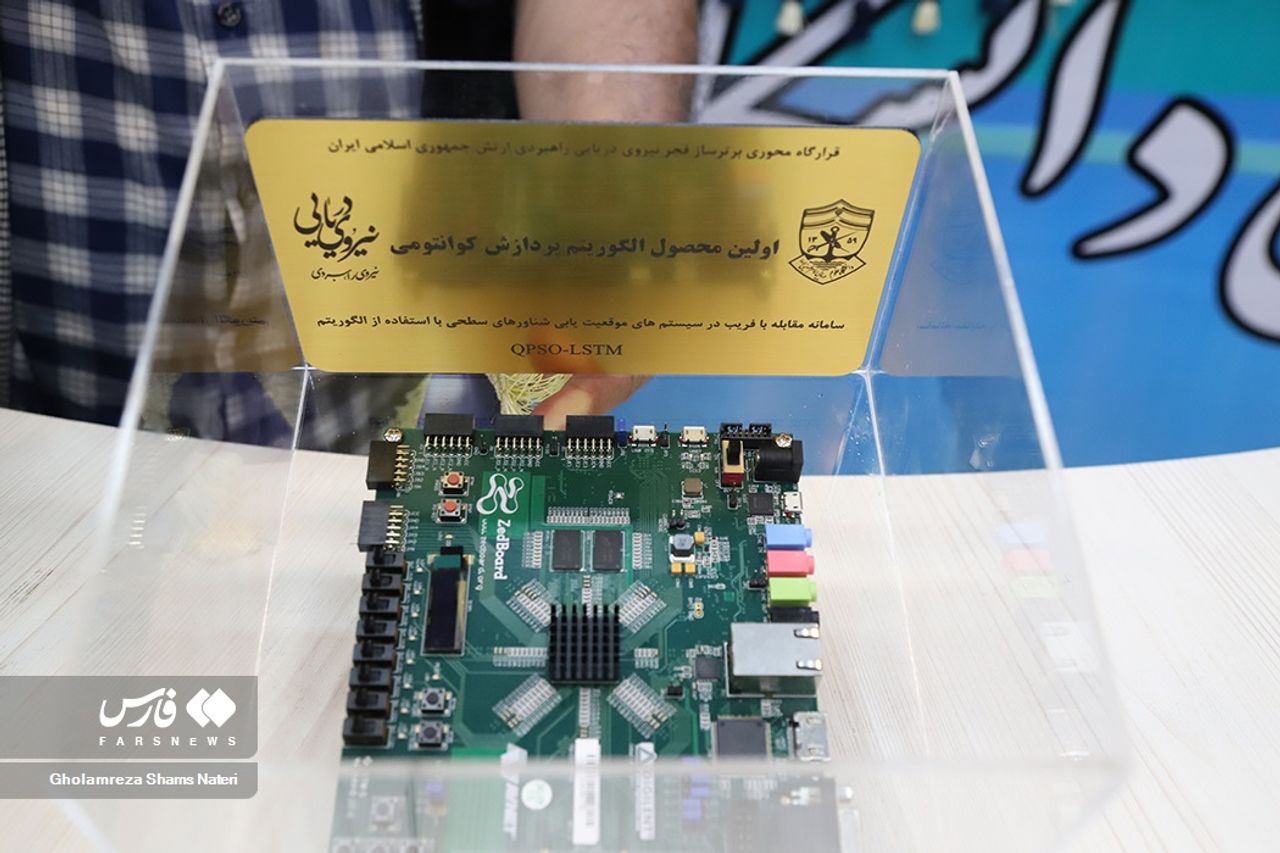Iran's 'Quantum' Computer is Apparently Powered by an Arm Development Board
There's not much quantum to Iran's quantum computing, it seems.

Get Tom's Hardware's best news and in-depth reviews, straight to your inbox.
You are now subscribed
Your newsletter sign-up was successful
Last week, Iran's Rear Admiral Habibollah Sayyari stunned the quantum computing world by claiming the country had already developed and deployed quantum computing products to aid its military operations. But it now seems there was quite a bit less quantum involved than claimed. It seems the quantum computing board showcased by the Rear Admiral just last week had zero quantum computing in it and 100% of an Amazon-available ARM-based development board (ZedBoard), built by US-based Digilent.
Oh, the irony.

Read Admiral Habibollah Sayyari, Coordinating Deputy of the IR Army and the former Commander of the Iranian Navy, posed for photographs with other high-ranking military officials while claiming the newly-designed quantum computing board brought the country's capabilities towards the cutting edge. Namely, it was claimed that quantum computing was already being deployed by the Iranian military to "counter navigation deception in detecting surface vessels using the quantum algorithms."
Every company and state (and their mothers) seem keen to show off their quantum computing capabilities. This is an understandable stance; quantum computing is expected to be the "next big thing" in computing (even though the ChatGPTs and AI advancements of the world have been eclipsing quantum in the population's mind). Considering quantum computing's implications on communications security, cryptography, and many other crucial technological areas, it's expected that certain actors flex their quantum muscles towards opponents - it's both a deterrent and a claim of technological superiority.

Of course, stunts such as these do sometimes bite back; Persian media has already ridiculed the move, which has had the unintended side-effect of showcasing just how behind the quantum curve Iran really is: so much so that a gold plaque can be made for a €700, dual-core, DDR3-toting development board. It seems that the Iranian government did manage to get some quantum onto its announcement, considering how its narrative has decohered. But that's not usually the intention of making quantum computing-related announcements, is it?
For now, it seems that users looking for an over-the-counter quantum computing experience will still have to settle for SpinQ's education-aimed "Quantops." Those at least allow you to simulate qubits, which still is 100% more of them than available on Iran's ZedBoard.
Get Tom's Hardware's best news and in-depth reviews, straight to your inbox.

Francisco Pires is a freelance news writer for Tom's Hardware with a soft side for quantum computing.
-
bit_user We don't know that they don't have a real quantum computer. All we know is their PR prop was a dud.Reply
Obviously, quantum computers are very large and sensitive pieces of equipment. It's also sensitive technology and maybe you don't want real photos that show your adversaries key details of what you're doing.
So, if we take their word for it, then what I think happened is that some general asked the research team for something to show in front of the cameras. Someone had that development board lying around for some reason, and they just handed it to him. It doesn't mean a thing about what capabilities they might or might not have, with regard to QC. -
RichardtST Unlikely it was PR. More likely they actually believed it was real.Reply
Never assume that leadership has any brainpower.
Usually they do not. To you and I this spoof is obvious, but 99.99% of the population
has never seen the inside of a computer much less a nice little dev board.
Of course, if word gets back around that this isn't real quantum device,
then the engineers might be in a spot of trouble... -
helper800 Reply
On the other hand, all we can trust is what we can see, and since they showed a run of the mill ARM board and called it 'quantum computing' it seems extremely unlikely that they have anything other than that.bit_user said:We don't know that they don't have a real quantum computer. All we know is their PR prop was a dud.
Obviously, quantum computers are very large and sensitive pieces of equipment. It's also sensitive technology and maybe you don't want real photos that show your adversaries key details of what you're doing.
So, if we take their word for it, then what I think happened is that some general asked the research team for something to show in front of the cameras. Someone had that development board lying around for some reason, and they just handed it to him. It doesn't mean a thing about what capabilities they might or might not have, with regard to QC. -
ezst036 Reply
Half the time you cannot even trust that.helper800 said:On the other hand, all we can trust is what we can see -
bit_user Reply
Let's imagine they do have a functional quantum computer. Would you expect them to show a picture of it? Even when doing so would betray more information about it than they would probably want?helper800 said:On the other hand, all we can trust is what we can see, and since they showed a run of the mill ARM board and called it 'quantum computing' it seems extremely unlikely that they have anything other than that.
I just think it's more dangerous to underestimate your adversary than to overestimate them. If it were my job to worry about Iran (and thank goodness it's not), I'd treat this whole incident largely as noise. -
bit_user Reply
A quantum computer is just a quantum computer. Tom's has covered the quantum computing "race" for the past decade. If Iran is now a player, whether motivated by military or other applications, that's newsworthy. Since this PR debacle happened in the course of making such an announcement, I suppose it also qualifies.purpleduggy said:nice propaganda piece, tomshardware. i don't care about military hardware that is used to harm people.
Crysis, I'd guess. I think the kids there follow a lot of media, games, etc. from abroad (much of it even from the West).dimar said:What's the equivalent of Crysis in Iran? -
TerryLaze Reply
There are many detailed pics of actually working quantum computers free on google so what would be the issue?!bit_user said:Let's imagine they do have a functional quantum computer. Would you expect them to show a picture of it? Even when doing so would betray more information about it than they would probably want?
I just think it's more dangerous to underestimate your adversary than to overestimate them. If it were my job to worry about Iran (and thank goodness it's not), I'd treat this whole incident largely as noise.
Yes I would expect them to show a picture, even if it's just of an blow up mock up like russia used to do with tanks to show strength.
And yes sure, that dev board has an FPGA on it so it could be a control board (or part of one) for the quantum computer. -
bit_user Reply
There are different approaches and levels of sophistication. I'm just suggesting that they mightn't want to show an actual picture their QC (if they even have one), because it might reveal too much about such details - particularly if they don't actually have it working yet.TerryLaze said:There are many detailed pics of actually working quantum computers free on google so what would be the issue?!
Those were meant to be seen from high-altitude surveillance planes or satellites, from which they were thought not to be obvious fakes.TerryLaze said:Yes I would expect them to show a picture, even if it's just of an blow up mock up like russia used to do with tanks to show strength.
Yes, it did occur to me that they might use such a board at some stage of QC control. I didn't really want to get onto that particular tangent, because the fact remains it's decidedly not a QC, nor serves as any kind of proof of one.TerryLaze said:And yes sure, that dev board has an FPGA on it so it could be a control board (or part of one) for the quantum computer.